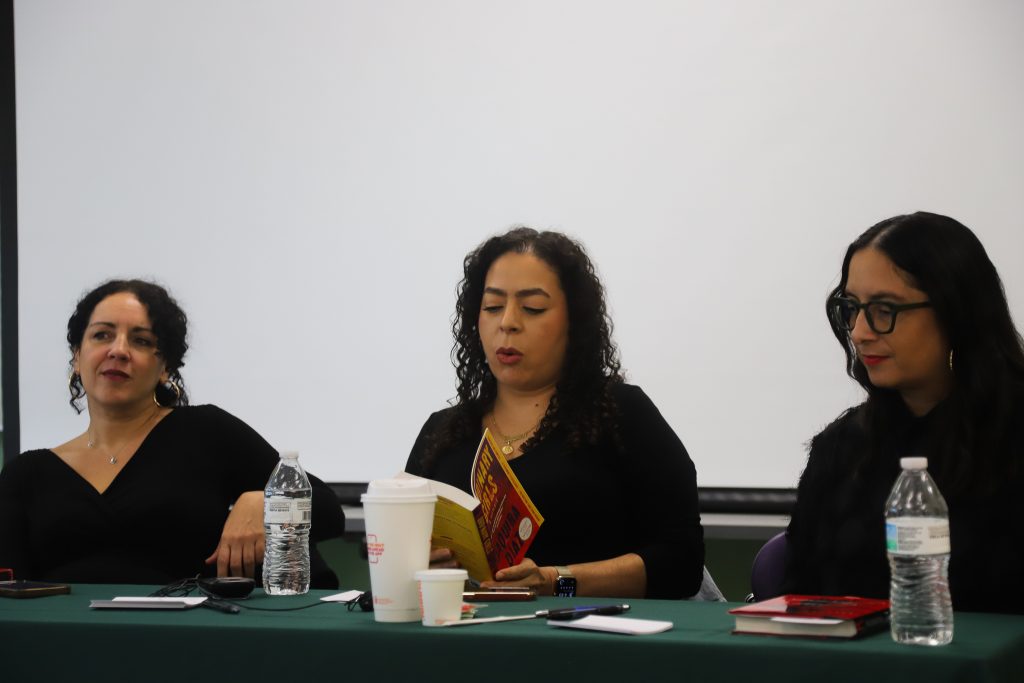As part of Binghamton University’s Hispanic Heritage Month celebration, award-winning authors Lilliam Rivera ‘93, Angie Cruz ‘97 and Jaquira Diaz took the stage for a Latine Author Panel.
Hosted by the Latin American and Caribbean Studies program at the University Union on Wednesday, students and community members discussed identity and the importance of Latine voices in literature. Before the panel, a tabling session was held, showcasing student and community organizations like the American Civic Association to spread awareness about immigration services and student opportunities offered throughout the Southern Tier.
Azuquita Pal Café — a popular song by El Gran Combo De Puerto Rico — echoed through the room as people entered. The panel began with remarks from Giovanna Montenegro, the director of LACAS and an associate professor of comparative literature and romance languages, who reflected on the event’s timing amid the current social and political climate.
“With the forthcoming elections, negative media portrayal of Latin American and Caribbean immigrants is at an all-time high,” Montenegro said. “We wanted to celebrate the contributions of our students and the amazing work they’re doing for their student [organizations] and also create space for Latine authors.”
Montenegro acknowledged the 50-year history of LACAS at the University, beginning with student activism by the Latin American Student Union demanding curricula reflecting Latine history and culture. She thanked the organizations and academic departments that contributed to the event, including romance languages, comparative literature, English, history and women, gender and sexuality studies.
Cruz, an alumna and a professor at the University of Pittsburgh and the author of the novel “How Not to Drown in a Glass of Water,” served as the panel’s moderator, recalling that while her time at BU was marked by loneliness, it made her the writer she is today. She notably wrote the last line of her first book “Soledad” in a creative writing class.
Diaz, author of the memoir “Ordinary Girls: A Memoir,” highlighted writing about trauma without becoming overwhelmed by it — describing the challenge as a sort of therapy that helped her process the experiences informing her work.
“Something terrible happened in your life and you’re turning it into art and sharing it with someone else,” said Diaz. “It’s really intimate.”
After Diaz spoke, Rivera, discussed her recently released horror novel “Tiny Threads.” Set in Vernon, an industrial town outside of Los Angeles, the novel explores the hidden costs of capitalism on marginalized communities. Rivera examined how her experiences working in the fashion industry and living in East Los Angeles influenced her writing, connecting her observations of the environmental damage in Los Angeles and Maywood to her novel’s dark themes.
Indirah Ridore Jean-Baptiste, a junior majoring in Latin American and Caribbean Studies, echoing a response given by the panelists, said the publishing industry is responsible for releasing these stories to provide a more complete, comprehensive representation of Latine communities.
“There’s no way that even just these three writers can talk about their communities in depth or fully accurately represent every single story,” Jean-Baptiste said. “Also how people, like their white counterparts, wouldn’t be asked the same question, and it made me think of the responsibility that people of color, authors and just in general, have to always be walking representations of their community.”



